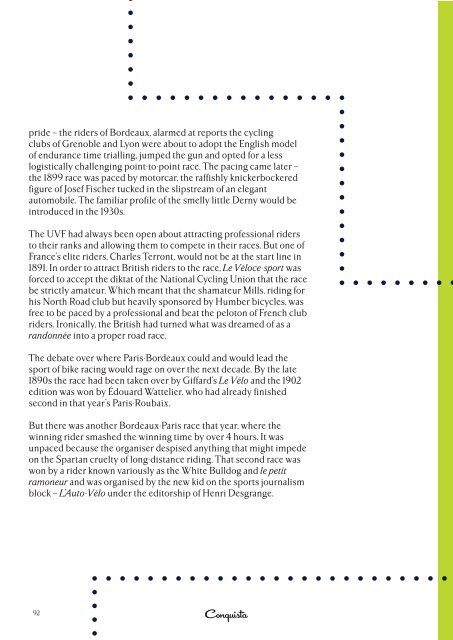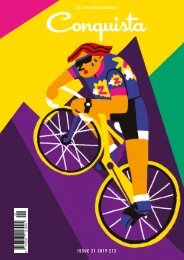You also want an ePaper? Increase the reach of your titles
YUMPU automatically turns print PDFs into web optimized ePapers that Google loves.
pride – the riders of Bordeaux, alarmed at reports the cycling<br />
clubs of Grenoble and Lyon were about to adopt the English model<br />
of endurance time trialling, jumped the gun and opted for a less<br />
logistically challenging point-to-point race. The pacing came later –<br />
the 1899 race was paced by motorcar, the raffishly knickerbockered<br />
figure of Josef Fischer tucked in the slipstream of an elegant<br />
automobile. The familiar profile of the smelly little Derny would be<br />
introduced in the 1930s.<br />
The UVF had always been open about attracting professional riders<br />
to their ranks and allowing them to compete in their races. But one of<br />
France’s elite riders, Charles Terront, would not be at the start line in<br />
1891. In order to attract British riders to the race, Le Véloce-sport was<br />
forced to accept the diktat of the National Cycling Union that the race<br />
be strictly amateur. Which meant that the shamateur Mills, riding for<br />
his North Road club but heavily sponsored by Humber bicycles, was<br />
free to be paced by a professional and beat the peloton of French club<br />
riders. Ironically, the British had turned what was dreamed of as a<br />
randonnée into a proper road race.<br />
The debate over where Paris-Bordeaux could and would lead the<br />
sport of bike racing would rage on over the next decade. By the late<br />
1890s the race had been taken over by Giffard’s Le Vélo and the 1902<br />
edition was won by Édouard Wattelier, who had already finished<br />
second in that year’s Paris-Roubaix.<br />
But there was another Bordeaux-Paris race that year, where the<br />
winning rider smashed the winning time by over 4 hours. It was<br />
unpaced because the organiser despised anything that might impede<br />
on the Spartan cruelty of long-distance riding. That second race was<br />
won by a rider known variously as the White Bulldog and le petit<br />
ramoneur and was organised by the new kid on the sports journalism<br />
block – L’Auto-Vélo under the editorship of Henri Desgrange.<br />
92















